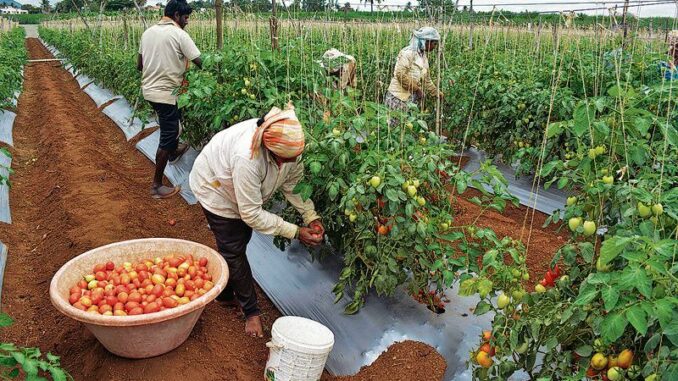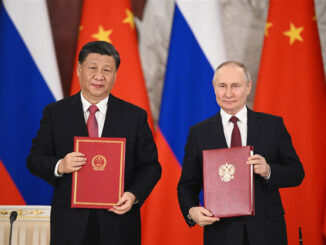
The only plausible way to pull the farmers out of perpetual poverty is by ensuring a legally binding framework for guaranteeing farm prices.
Providing a legally guaranteed MSP to farmers who have marketable surplus and providing direct income support to marginal farmers is the big reform that agriculture awaits.

It is called the pension reform. Prime Minister Narendra Modi has said that the Unified Pension Scheme (UPS) ensures dignity and financial security for government employees. “We are proud of the hard work of all government employees who contribute significantly to national progress,” he said.
In reality, the UPS — which assures a pension equivalent to 50 per cent of the last drawn salary — is an acknowledgement that the earlier market-linked New Pension Scheme had not worked for government employees. To assure a ‘defined benefit’ for government employees, the Union Cabinet tweaked the pension scheme to ensure that the retirees do not have to face the tyranny of the markets.
While the PM has also applauded the country’s farmers on a number of occasions and has often admired the resilience demonstrated by the farming community, there have been no takers for their long-pending demand for guaranteed prices. If markets have failed for retired employees, let me make it clear that markets have also failed for farmers. If employees need an assured pension, farmers also need an assured price.
Nowhere in the world have markets ensured a higher income for farmers. In the major economies, either the subsidy fills the income gap (China has emerged at the top in providing agricultural subsidies) or agriculture is conveniently left at the mercy of market forces, like in India. The result, as some studies have shown, is not only that Indian farmers are at the bottom of the pyramid but also that they have been incurring losses year after year for nearly 25 years now.
The only plausible way to pull the farmers out of perpetual poverty is by ensuring a legally binding framework for guaranteeing farm prices. Regardless, the NDA government had sworn in an affidavit before the Supreme Court some years back that a law to guarantee a minimum support price (MSP) would distort the markets. Strangely, when it comes to farmers, policymakers raise the bogey of assured prices distorting markets. For employees, everyone is fine with an assured pension; the fear of distorting markets suddenly disappears.
While mainline economists believe that a legal MSP will jack up consumer prices and thereby distort markets, in reality, it will squeeze corporate profits, and hence the outcry. Strangely, the same breed of free-market economists remain quiet when corporates in America go in for ‘price gouging’ — jacking up prices to rip off the consumers. This actually is price distortion. Already, 38 states, including California, Florida and New York, have brought in laws that prohibit the practice. For instance, the state of New York went against companies that had hiked the prices of hand sanitizers by 400 per cent during the pandemic. And yet, many market economists have called such checks on visible market distortions a return to Soviet-style price controls.
The bias in favor of markets crops up when farmers have to be provided with economic security, but not when corporates jack up prices to extract their pound of flesh. This double speak on market distortion is coming in the way of providing farmers with a living income. As I have said before, markets will automatically adjust to the assured prices for farmers. It is only the ideology that is coming in the way.
US Vice-President Kamala Harris has called for a ban on corporate price gouging, which alone is responsible for a 53 per cent increase in the prices of food and grocery items since the pandemic. Republicans have called her position on it ‘communist’. Whatever the right wing may say, there is no denying, as some economists have acknowledged, that a ban on price gouging is good economics as well as good politics. Harris has promised action against companies that are keeping food prices artificially high.
Returning to the employees’ pension, it is interesting to see the Department of Expenditure make an all-out effort to justify the decision, terming it ‘fiscally prudent’ and claiming that “it will be preventing fiscal hardship to future generations of citizens.” Certainly, there is no one against an assured pension for employees. But if the employees can be assured of social security, there is no reason why economic security cannot be assured for farmers. They also contribute significantly to the national progress, and it is because of their relentless hard work that the country has food security.
When Kamlesh Patidar, a farmer from Madhya Pradesh’s Mandsaur district, re-ploughed his standing soybean crop on 10 acres, he did not realize that it would trigger a chain reaction. Just few days after a video of the incident went viral, reports of several anguished farmers uprooting the crop poured in.
The crash in soybean prices — and that too, a month and a half before the harvesting season — has negated another economic belief that suggests farmers should hold on to harvest till the time they can realize a better price. Patidar had saved his last year’s harvest in the hope of getting a higher price later. But even that did not work.
While the ruling soybean prices have dropped to a level that existed 12 years back, the destruction of farm livelihoods leaves hundreds of thousands of soybean farmers seething with anger. The prices, which are much lower than the MSP, are not even enough to cover the production costs. I wonder when we will have an assured price policy for farmers that will prevent fiscal hardship for not only future generations of farmers but also the present one.
Soon thereafter, reports about tomato prices crashing by 60 per cent to a low of Rs 300 per crate of 25 kg poured in. And then came news reports about basmati prices falling by 28 per cent to Rs 2,500 per quintal. It is not something unique happening this year; it has emerged as a painful annual trend that the nation does not feel concerned about.
Providing a legally guaranteed MSP to farmers who have marketable surplus and providing direct income support to marginal farmers is the big reform that agriculture awaits.
(Devinder Sharma is a Writer, Researcher, Columnist, Author. He specializes in economics, global trade, food and agricultural policy, environment, and development. @Devinder_Sharma)





Be the first to comment